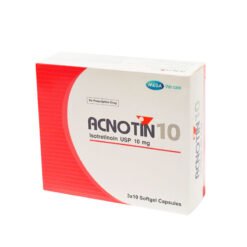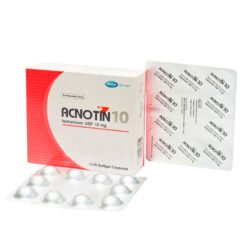MegaWeCare Acnotin® Isotretinoin 10 mg.
$95.00 Original price was: $95.00.$80.00Current price is: $80.00.
What is Acnotin® used for?
Acnotin® (Isotretinoin) is a vitamin A derivative known as a retinoid that is used to treat severe acne that has not responded to other acne medications.
The original brand, Accutane, is no longer on the market. However, the drug is sometimes still referred to by this name. Some other common brands include Roaccutane and Oratane.
Isotretinoin targets the underlying causes of acne. Isotretinoin helps treat acne by shrinking the oil glands (sebaceous glands), preventing clogged pores and reducing oil (sebum) production. Isotretinoin is also excellent at killing bacteria in the pores that contribute to the formation of new acne and possesses anti-inflammatory effects.
This medication may also be used for other conditions as determined by your doctor.
How effective is Isotretinoin?
Treatment with Isotretinoin has a high average success rate of around 85% for patients who complete the treatment course (usually 4-6 months). For patients with severe or cystic acne, a 6-month course of Isotretinoin offers the best treatment to alleviate the symptoms of severe acne. After initiating Isotretinoin, you should see an improvement in your acne within 1-2 months.
A small percentage of patients may choose to take a second course of Isotretinoin if they still have significant acne after completing their first course. This can be initiated after taking a 2 month break.
Dosage and how to use
Isotretinoin is available in the form of capsules. Take this medication as directed by your doctor. Swallow the capsules whole with a glass of water. Do not chew or crush the capsule. Take this medication with or after food to improve absorption.
What to do if I missed a dose?
If you forget to take a dose, take it as soon as you remember. If it is almost time for your next dose, skip the missed dose. Then take your next dose at the usual time. Do not take two doses to make up for the missed dose.
What are the possible side effects of Acnotin®?
In some people, the acne may seem to get worse during the first few weeks before improving.
Certain side effects of this medication may happen and may even disappear during treatment. If any of the following effects persist or are severe, consult your doctor. These side effects include:
- Red, cracked and sore lips. Apply lip balm frequently.
- Irritated and dry eyes. Apply eye-drops or artificial tears to prevent this. Stop the use of contact lenses if irritation persists.
- Dry skin, sometimes with peeling. Apply moisturiser regularly to manage skin dryness.
- Dry mouth. Drink more water or suck on sweets.
- Dry nose. Nose bleeding may occur for severe cases. Apply white soft paraffin to the lining inside of your nose. If it does not resolve, consult your pharmacist or doctor about decreasing the dose of the medication.
- Increased risk of sunburn. Avoid staying directly under sunlight for long durations. Use a broad-spectrum sunscreen product with Sun Protection Factor (SPF) of at least 30 and wear protective clothing when you are exposed to direct sunlight.
What are some rare but serious side-effects that I need to seek medical advice immediately?
The symptoms of a drug allergy include one or more of the following:
- Swollen face/eyes/lips/tongue
- Difficulty in breathing
- Itchy skin rashes over your whole body
The following uncommon side effects may occasionally occur. Consult your doctor if any of them becomes severe:
- severe headache
- muscle and joint pain or stiffness – avoid strenuous exercise
- temporary hair loss
- severe diarrhea
- nausea and vomiting
- dizziness
- blurred vision or changes in your vision (rare)
- mood changes including depression (rare)
Your doctor will also perform blood tests (cholesterol/triglycerides and liver function test) before you start the treatment and at least once during the course of treatment. This is to monitor for any abnormalities as isotretinoin can cause the level of cholesterol and triglycerides in your blood to increase and may cause raised liver enzymes.
What precautions should I take?
Inform your healthcare professional if:
- You are allergic to this medication or any of the other ingredients of this medication
- You have diabetes, high cholesterol or triglycerides (fat in the blood), liver or kidney disease
- You are taking any other medications, including supplements, traditional medications and herbal remedies
- You are planning to undergo any surgical or dental procedures
- You are planning to undergo any skin or hair removal procedures e.g. waxing, dermabrasions, facial peels, laser treatments. This medication may cause skin to become more fragile, increasing the risk of poor wound healing and scar formation. Avoid these procedures during treatment and for at least 6 months after stopping the medication.
- You are planning to donate blood. Do not donate blood when taking the medication and for at least 1 month after stopping the medication. This is to prevent passing donated blood to a pregnant woman and causing harm to the baby.
For female patients:
- Isotretinoin has been reported to cause serious harm to unborn babies when taken during pregnancy. Women who are pregnant, who intend to become pregnant, or who are breast-feeding should tell their doctors before taking this medication.
- You must use strict birth control for at least 1 month before you start isotretinoin, for the whole time you are taking isotretinoin and for at least 1 month after discontinuing this medication. Discuss contraception with your doctor or pharmacist.
- Before you start taking your course of isotretinoin, you should wait until the 2nd or 3rd day of your next menstrual period. If you suspect you are pregnant, do not start the isotretinoin at all.
- If you are already taking isotretinoin and discover that you have become pregnant, stop taking it immediately and tell your doctor.
What other medications and foods should I avoid when taking Acnotin®?
- Avoid taking alcohol when taking this medication as it can increase the level of triglycerides (fats) in your blood.
- Do not take vitamin A supplements or multivitamins that contains vitamin A.
- Do not take this medication if you are on any tetracycline class of antibiotics (doxycycline, minocycline, and tetracycline). This can increase the risk of high pressure in the brain leading to headaches, nausea and vomiting.
Handling and storage
- Store in a cool and dry place, away from direct sunlight.
- Keep the medicine out of reach of children.
- Throw away all expired medicines.
The above information answers some common questions about this medicine. It does not contain all the available information. It also does not take the place of talking to your doctor or pharmacist.
References
https://www.healthhub.sg/a-z/medications/115/Isotretinoin




